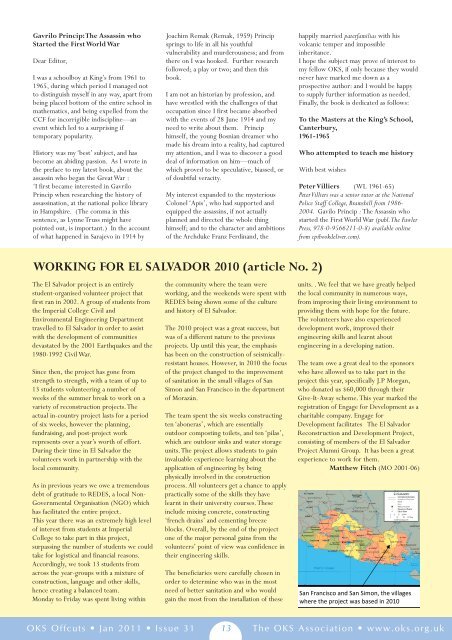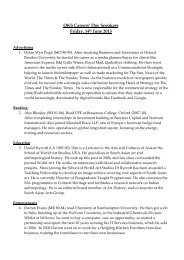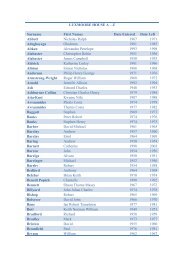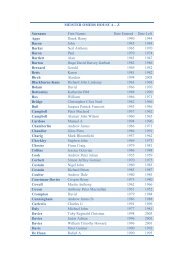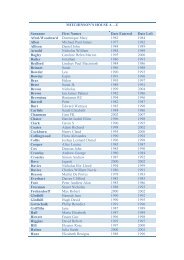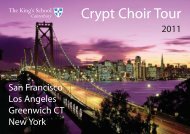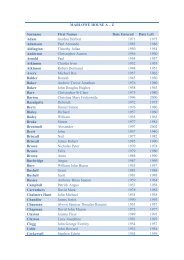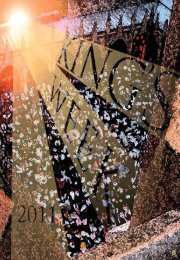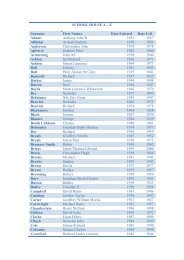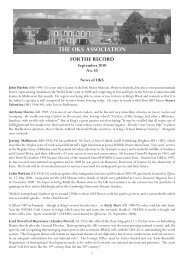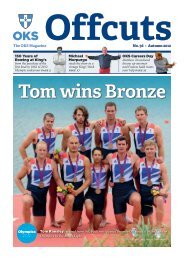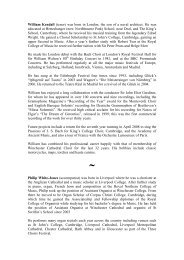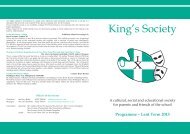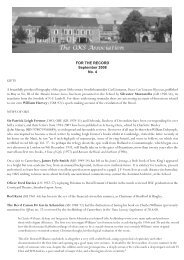January 2011 offcuts_Jan Offcuts 2010.qxd.qxd - The OKS Association
January 2011 offcuts_Jan Offcuts 2010.qxd.qxd - The OKS Association
January 2011 offcuts_Jan Offcuts 2010.qxd.qxd - The OKS Association
Create successful ePaper yourself
Turn your PDF publications into a flip-book with our unique Google optimized e-Paper software.
Gavrilo Princip: <strong>The</strong> Assassin who<br />
Started the First World War<br />
Dear Editor,<br />
I was a schoolboy at King’s from 1961 to<br />
1965, during which period I managed not<br />
to distinguish myself in any way, apart from<br />
being placed bottom of the entire school in<br />
mathematics, and being expelled from the<br />
CCF for incorrigible indiscipline—an<br />
event which led to a surprising if<br />
temporary popularity.<br />
History was my ‘best’ subject, and has<br />
become an abiding passion. As I wrote in<br />
the preface to my latest book, about the<br />
assassin who began the Great War :<br />
‘I first became interested in Gavrilo<br />
Princip when researching the history of<br />
assassination, at the national police library<br />
in Hampshire. (<strong>The</strong> comma in this<br />
sentence, as Lynne Truss might have<br />
pointed out, is important.) In the account<br />
of what happened in Sarajevo in 1914 by<br />
Joachim Remak (Remak, 1959) Princip<br />
springs to life in all his youthful<br />
vulnerability and murderousness; and from<br />
there on I was hooked. Further research<br />
followed; a play or two; and then this<br />
book.<br />
I am not an historian by profession, and<br />
have wrestled with the challenges of that<br />
occupation since I first became absorbed<br />
with the events of 28 June 1914 and my<br />
need to write about them. Princip<br />
himself, the young Bosnian dreamer who<br />
made his dream into a reality, had captured<br />
my attention, and I was to discover a good<br />
deal of information on him—much of<br />
which proved to be speculative, biassed, or<br />
of doubtful veracity.<br />
My interest expanded to the mysterious<br />
Colonel ‘Apis’, who had supported and<br />
equipped the assassins, if not actually<br />
planned and directed the whole thing<br />
himself; and to the character and ambitions<br />
of the Archduke Franz Ferdinand, the<br />
happily married paterfamilias with his<br />
volcanic temper and impossible<br />
inheritance.<br />
I hope the subject may prove of interest to<br />
my fellow <strong>OKS</strong>, if only because they would<br />
never have marked me down as a<br />
prospective author: and I would be happy<br />
to supply further information as needed.<br />
Finally, the book is dedicated as follows:<br />
To the Masters at the King’s School,<br />
Canterbury,<br />
1961-1965<br />
Who attempted to teach me history<br />
With best wishes<br />
Peter Villiers (WL 1961-65)<br />
Peter Villiers was a senior tutor at the National<br />
Police Staff College, Bramshill from 1986-<br />
2004. Gavilo Princip : <strong>The</strong> Assassin who<br />
started the First World War (publ. <strong>The</strong> Fawler<br />
Press, 978-0-9566211-0-8) available online<br />
from cpibookdeliver.com).<br />
WORKING FOR EL SALVADOR 2010 (article No. 2)<br />
<strong>The</strong> El Salvador project is an entirely<br />
student-organised volunteer project that<br />
first ran in 2002. A group of students from<br />
the Imperial College Civil and<br />
Environmental Engineering Department<br />
travelled to El Salvador in order to assist<br />
with the development of communities<br />
devastated by the 2001 Earthquakes and the<br />
1980-1992 Civil War.<br />
Since then, the project has gone from<br />
strength to strength, with a team of up to<br />
13 students volunteering a number of<br />
weeks of the summer break to work on a<br />
variety of reconstruction projects. <strong>The</strong><br />
actual in-country project lasts for a period<br />
of six weeks, however the planning,<br />
fundraising, and post-project work<br />
represents over a year’s worth of effort.<br />
During their time in El Salvador the<br />
volunteers work in partnership with the<br />
local community.<br />
As in previous years we owe a tremendous<br />
debt of gratitude to REDES, a local Non-<br />
Governmental Organisation (NGO) which<br />
has facilitated the entire project.<br />
This year there was an extremely high level<br />
of interest from students at Imperial<br />
College to take part in this project,<br />
surpassing the number of students we could<br />
take for logistical and financial reasons.<br />
Accordingly, we took 13 students from<br />
across the year-groups with a mixture of<br />
construction, language and other skills,<br />
hence creating a balanced team.<br />
Monday to Friday was spent living within<br />
the community where the team were<br />
working, and the weekends were spent with<br />
REDES being shown some of the culture<br />
and history of El Salvador.<br />
<strong>The</strong> 2010 project was a great success, but<br />
was of a different nature to the previous<br />
projects. Up until this year, the emphasis<br />
has been on the construction of seismicallyresistant<br />
houses. However, in 2010 the focus<br />
of the project changed to the improvement<br />
of sanitation in the small villages of San<br />
Simon and San Francisco in the department<br />
of Morazán.<br />
<strong>The</strong> team spent the six weeks constructing<br />
ten ‘aboneras’, which are essentially<br />
outdoor composting toilets, and ten ‘pilas’,<br />
which are outdoor sinks and water storage<br />
units. <strong>The</strong> project allows students to gain<br />
invaluable experience learning about the<br />
application of engineering by being<br />
physically involved in the construction<br />
process. All volunteers get a chance to apply<br />
practically some of the skills they have<br />
learnt in their university courses. <strong>The</strong>se<br />
include mixing concrete, constructing<br />
‘french drains’ and cementing breeze<br />
blocks. Overall, by the end of the project<br />
one of the major personal gains from the<br />
volunteers’ point of view was confidence in<br />
their engineering skills.<br />
<strong>The</strong> beneficiaries were carefully chosen in<br />
order to determine who was in the most<br />
need of better sanitation and who would<br />
gain the most from the installation of these<br />
units. . We feel that we have greatly helped<br />
the local community in numerous ways,<br />
from improving their living environment to<br />
providing them with hope for the future.<br />
<strong>The</strong> volunteers have also experienced<br />
development work, improved their<br />
engineering skills and learnt about<br />
engineering in a developing nation.<br />
<strong>The</strong> team owe a great deal to the sponsors<br />
who have allowed us to take part in the<br />
project this year, specifically J.P Morgan,<br />
who donated us $60,000 through their<br />
Give-It-Away scheme. This year marked the<br />
registration of Engage for Development as a<br />
charitable company. Engage for<br />
Development facilitates <strong>The</strong> El Salvador<br />
Reconstruction and Development Project,<br />
consisting of members of the El Salvador<br />
Project Alumni Group. It has been a great<br />
experience to work for them.<br />
Matthew Fitch (MO 2001-06)<br />
SanFranciscoandSanSimon,thevillages<br />
wheretheprojectwasbasedin2010<br />
<strong>OKS</strong> <strong>Offcuts</strong> • <strong>Jan</strong> <strong>2011</strong> • Issue 31<br />
13<br />
<strong>The</strong> <strong>OKS</strong> <strong>Association</strong> • www.oks.org.uk


